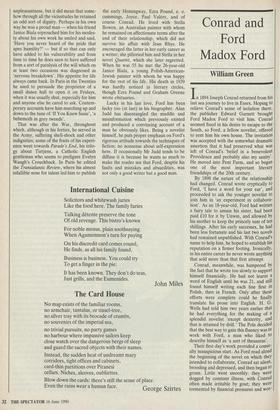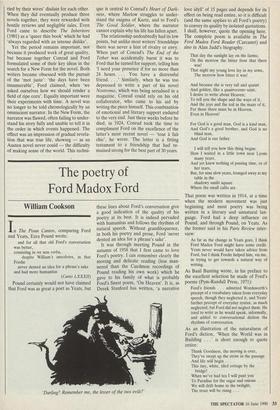Conrad and Ford Madox Ford
William Green
By 1898 the nature of the relationship had changed. Conrad wrote cryptically to Ford, 'I have a word for your ear', and proceeded to ask the younger novelist to join him in 'an experiment in collabora- tion'. As an 18-year-old, Ford had written a fairy tale to amuse his sister, had been paid £10 for it by Unwin, and allowed by his mother to keep the princely sum of ten shillings. After his early successes, he had been less fortunate and his last two novels had remained unpublished. With Conrad's name to help him, he hoped to establish his reputation on a firmer footing. Ironically, in his entire career he never wrote anything that sold more than that first attempt.
Conrad, meanwhile, was hampered by the fact that he wrote too slowly to support himself financially. He had not learnt a word of English until he was 21, and still found himself writing each line first in Polish, then in French. Only after these efforts were complete could he finally translate his prose into English. H. G. Wells had told him two years earlier that he had everything for the making of a splendid novelist 'except dexterity, and that is attained by drill.' The Pole decided that the best way to gain this fluency was to work with Ford, a man who liked to describe himself as 'a sort of thesaurus'.
Their first day's work provided a comic- ally inauspicious start. As Ford read aloud the beginning of the novel on which they intended to collaborate, Conrad sat silent, brooding and depressed, and then began to groan. Little went smoothly: they were dogged by constant illness, with Conrad often made irritable by gout; they were tormented by financial pressures and wor- ried by their wives' disdain for each other. When they did eventually produce three novels together, they were rewarded with hostile reviews and negligible sales. Even Ford came to describe The Inheritors (1901) as a 'queer thin book' which he had `always regarded with an intense dislike'.
Yet the period remains important, not because it produced work of great quality, but because together Conrad and Ford formulated some of their key ideas in the search for a New Form for the novel. Both writers became obsessed with the pursuit of the 'mot juste': 'the days have been innumerable', Ford claimed, when 'we asked ourselves how we should render a field of ripe corn'. Equally important were their experiments with time. A novel was no longer to be told chronologically by an omniscient narrator. In the New Form, the narrator was flawed, often failing to under- stand his story fully and unable to tell it in the order in which events happened. The effect was an impression of gradual revela- tion that was true life, showing — as an Austen novel never could — the difficulty of making sense of the world. This techni- que is central to Conrad's Heart of Dark- ness, where Marlow struggles to under- stand the enigma of Kurtz, and to Ford's The Good Soldier, where the narrator cannot explain why his life has fallen apart.
The relationship undoubtedly had its low points, but unlike most writers' friendships there was never a hint of rivalry or envy. When part of Conrad's The End of the Tether was accidentally burnt it was to Ford that he turned for support, telling him `I need your presence if for no more than 24 hours. . . . You have a distressful friend. . . .' Similarly, when he was too depressed to write a part of his novel Nostromo, which was being serialised in a magazine, Conrad could rely on his old collaborator, who came to his aid by writing the piece himself. This combination of emotional and literary support endured to the very end. Just three weeks before he died, in 1924, Conrad took the time to compliment Ford on the excellence of the latter's most recent novel — `tout a fait chic', he wrote. The letter is a fitting testament to a friendship that had re- mained strong for the best part of 30 years.



















































 Previous page
Previous page